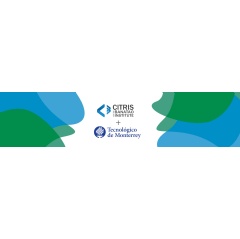CITRIS and ITESM Announce 2019 Seed Funded Projects
Launched in 2013, the CITRIS-ITESM Seed Funding Program supports binational collaborations between Tecnológico de Monterrey (ITESM) and CITRIS and the Banatao Institute that further our mutual research interests, strengthen connections among the campuses, and catalyze early-stage research that can lead to external funding.
This year’s awardees present innovative projects in the areas of intelligent transportation management, smart thermostats to reduce energy usage, crowdsourced strategies to predict mosquito-borne illnesses, and multisensory STEM educational materials for youth with hearing or visual impairments.
CITRIS and the Banatao Institute create information technology solutions for society’s most pressing challenges. Established in 2001 at the University of California, the Center for Information Technology Research in the Interest of Society (CITRIS) leverages the interdisciplinary strengths of multiple campuses to advance the university’s mission and the innovative spirit of California.
The Tecnológico de Monterrey (ITESM) was founded in 1943 by Eugenio Garza Sada and a group of Mexican entrepreneurs who implemented their vision for a cutting-edge educational institution. ITESM is a private, non-profit institution, independent from political and religious affiliations. ITESM seeks to develop leaders who embrace an entrepreneurial spirit, a humanistic outlook, and are competitive on an international scale.
Connecting Communities to Foster Inclusive STEM
Principal Investigators:
Eric Paulos (UC Berkeley, Electrical Engineering and Computer Science)
Cristina G. Reynaga-Peña (ITESM, School of Humanities and Education)
Juan Manuel Fernández-Cárdenas (ITESM, School of Humanities and Education)
Leonardo David Glasserman Morales (ITESM, School of Humanities and Education)
There is a deficit of innovative materials designed for inclusive STEM education for youth who have visual or auditory impairments at the K-12 levels. This project will connect communities of makers and educators to collaboratively produce a novel repository of 3D tactile interactive and multisensory educational materials for STEM education.
Machine Learning for Vector-borne Disease Surveillance to Augment the Smartphone App, DengueChat
Principal Investigators:
John M. Marshall (UC Berkeley, School of Public Health)
Edgar E. Vallejo (ITESM, School of Medicine)
A Strategy to Increase Energy Savings from Smart Thermostats Based on Gamification and Deep Learning
Principal Investigators:
Alan Meier (UC Davis, Environmental Science and Policy)
Pedro Ponce Cruz (ITESM, Graduate School of Engineering)
The demand for electricity in the USA and Mexico continues to grow. Smart thermostats enable homeowners and business to reduce air conditioning energy, but controls and utility tariffs can be complicated and intimidating. This project will design and pilot a gamification system based on deep learning for smart thermostats to help end-users learn how to reduce electricity usage.
Urban Transportation in Tijuana and Mexicali: Implications on Health and Environmental Justice Development
Principal Investigators:
Sergio Castellanos (UC Berkeley, California Institute for Energy and Environment)
Rubén Garnica Monroy (ITESM, School of Humanities and Education)
Urban population growth is on the rise in Mexico and the number of vehicles on the road has doubled every 10 years, a growth pattern that is expected to continue. With increased cars on the road comes increased CO2 emissions. This projects will map mobility patterns and air quality to develop an index that will allow for the identification of priority areas for implementation of improved mobility systems.
Note: The 2019 CITRIS Core Seed Funding Program is open until Jan. 31, 2019.
Dengue, Zika, Chikungunya and other mosquito-borne diseases pose a major global health burden throughout the Americas. Currently, control efforts are dependent on vector control and personal protection measures. This project will expand the DengueChat platform (https://www.denguechat.org/) to include crowdsourced data to develop robust statistical and machine learning models that enable real-time prediction of mosquito density and disease incidence.
( Press Release Image: https://photos.webwire.com/prmedia/7/233005/233005-1.jpg )
WebWireID233005
This news content was configured by WebWire editorial staff. Linking is permitted.
News Release Distribution and Press Release Distribution Services Provided by WebWire.
